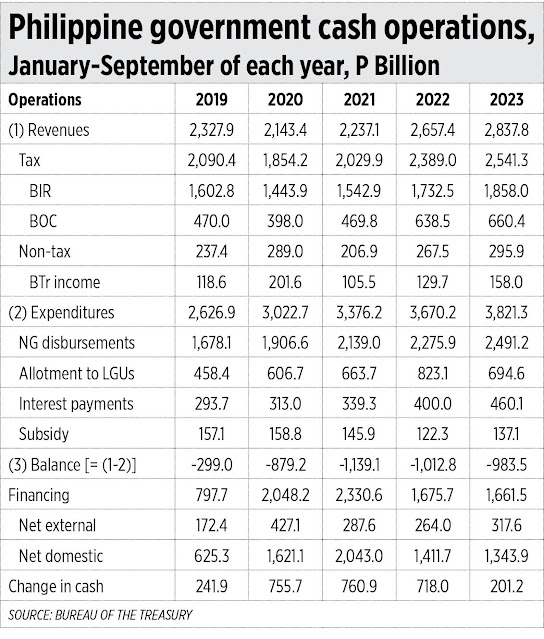Financing growth by improving revenue and controlling illicit trade
November 30, 2023
My Cup Of Liberty
By Bienvenido S. Oplas, Jr.
https://www.bworldonline.com/opinion/2023/11/30/560451/financing-growth-by-improving-revenue-and-controlling-illicit-trade/
(Part 8)
There have been several positive developments in the Philippine economy aside from the 5.9% GDP growth in the third quarter (Q3) of 2023. See for instance these reports in BusinessWorld in the last two weeks: “Foreign investment pledges surge in Q3” (Nov. 15), “Tourism revenue tops P404 billion in first 10 months” (Nov. 16), “German businesses in PHL report satisfactory business conditions” (Nov. 16), “Around 80 infrastructure projects to be financed by MIF” (Nov. 17), “Marcos’ US trip yields $672M in investment commitments” (Nov. 21), “PPA profit nears P10 billion after rise in cargo volumes” (Nov. 23), “PEZA investment approvals surge” (Nov. 24), “BPO industry sees headcount growing 7-8% next year” (Nov. 27), “Philippines could reach upper middle-income status by 2025 or 2026” (Nov. 27), and, “International visitor arrivals breach 4.8 million DoT target” (Nov. 28).
Another development is the improvement in revenues in the first nine months of the year even without big new tax hikes, resulting in a lower budget deficit for the same period. Financing or borrowings have also stabilized below P2 trillion over the same period compared to 2020 and 2021 (see the table).
The government must control two big items in the expenditure side: interest payments due to high borrowing over the past three years, and controlling some disbursements like the burdensome military and uniformed personnel (MUP) pension because the active personnel here still do not contribute to their own future pension, the pensioners receive funds much higher than their last salaries before retiring, and it is tax free.
Bureau of Internal Revenue (BIR) collections this year have increased 7.2% over same months last year while Bureau of Customs (BoC) collections this year have increased only by 3.4%.
Illicit trade, smuggling, and the non-payment of the appropriate taxes are the major contributors for the BoC’s lower actual collections versus potential collections. Smuggling of tobacco products is a particular issue. See for instance these reports in BusinessWorld: “High tobacco taxes encourage smuggling, economist says” (Oct. 12), “PHL to lose P60B from illicit tobacco” (Oct. 18), “BIR confiscates illicit cigarettes” (Nov. 14), “LGU share of tobacco tax set at P21 billion” (Nov. 19), and, “PHL cited as among region’s leaders in curbing illicit trade” (Nov. 20).
The P60 billion/year in tax losses due to tobacco smuggling alone is according to Congressman Joey Salceda, chairman of the House Committee on Ways and Means. He made that estimate only last October. In March 2021, his estimate was P30 billion/year.
The last report refers to a paper released two weeks ago by the Transnational Alliance to Combat Illicit Trade (TRACIT), the 48-page report, “Fighting Fakes, Contraband and Illicit Trade: Spotlight on The Philippines.” TRACIT is a New York-based private organization composed of big multinationals whose products are subject to rampant counterfeiting and smuggling like beer, whisky, fashion and accessories, pharmaceuticals, personal care, tobacco, etc.
In their report about the Philippines, they highlighted five sectors or products subject to heavy counterfeiting and smuggling: pirated products (software, music, media…), fake medicines, illicit alcohol, illicit tobacco, and illicit petroleum products.
Among their recommendations to control the huge illicit trade are: stronger border control by the BoC, improve regional cooperation and engage international law enforcement, invest in enforcement including intellectual property rights, improve criminal deterrence including anti-money laundering measures, implement coherent domestic tax policies to avoid substitution of illicit product alternatives, enhance transparency and accountability via corruption control, empower consumers through awareness and partner with the private sector, and improve the digital environment.
A tall order but all necessary steps. I can summarize these with one phrase: enforce the rule of law. The law applies equally to unequal people and firms, no one is exempted, and no one can grant an exemption. So, the laws on importation, taxation, intellectual property, etc. should apply to all players including friends of law enforcement agencies. Thus, the huge price difference between legal tobacco (the cheapest is P130/pack because excise tax alone is already P60/pack) and illegal tobacco (currently priced at only P40/pack) should not be happening.
The economic team’s growth target of 6.5% to 8% yearly from 2024 to 2028 and beyond should be retained. The ambition to create more new jobs yearly should be retained. Financing big infrastructure, financing growth is possible without new taxes or raising existing ones, just strictly enforce existing laws on importation, taxation, and anti-corruption. n
See also previous “Financing growth” papers in this column: Part 7, “Financing growth via more PPP funding” (Nov. 2), Part 6, “Financing growth: Maharlika Fund and SWFs from abroad” (Oct. 24), Part 5, “Financing growth: Reducing interest payments and spending control” (Oct. 5), and Part 4, “Financing growth: a rice tariff cut, an MUP pension cut, and reforms in excise tax in mining, oil, and coal” (Sept. 26).
-------------------
See also:
BWorld 658, Economic forecast 2024, November 27, 2023
BWorld 659, Economic forecast 2024 (Part 2), November 29, 2023
BWorld 660, On Meralco PSA bidding and nuclear power development, November 30, 2023.

No comments:
Post a Comment